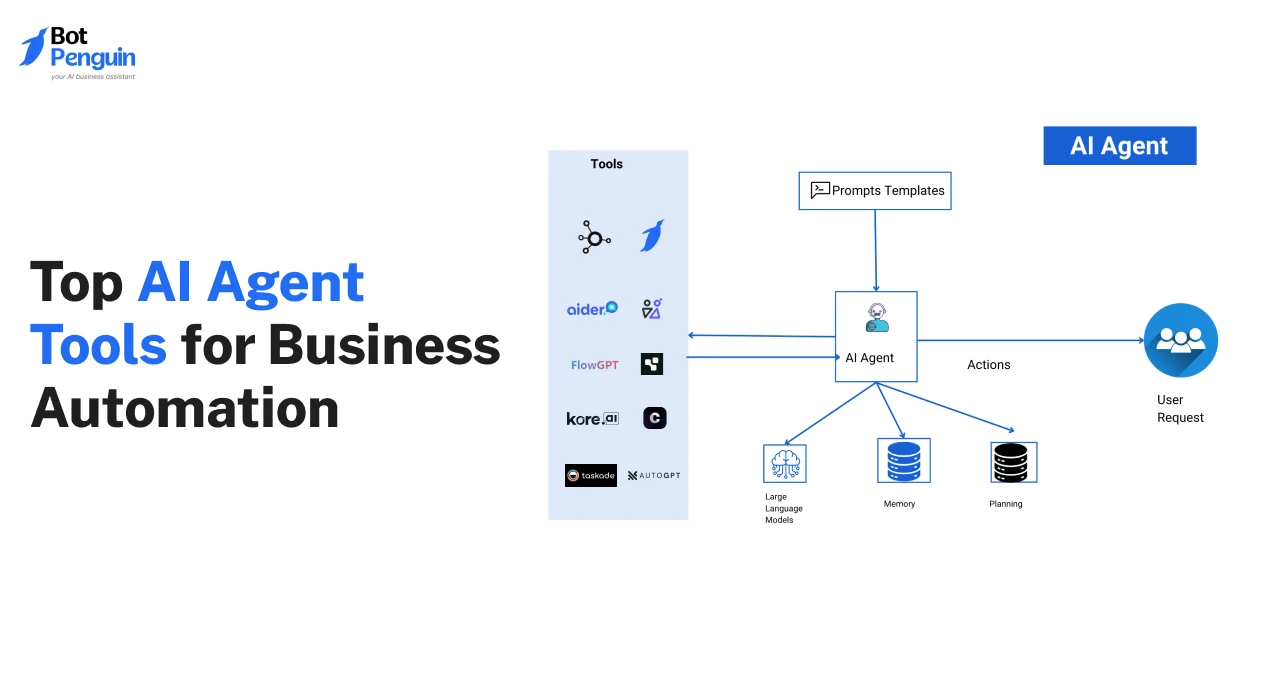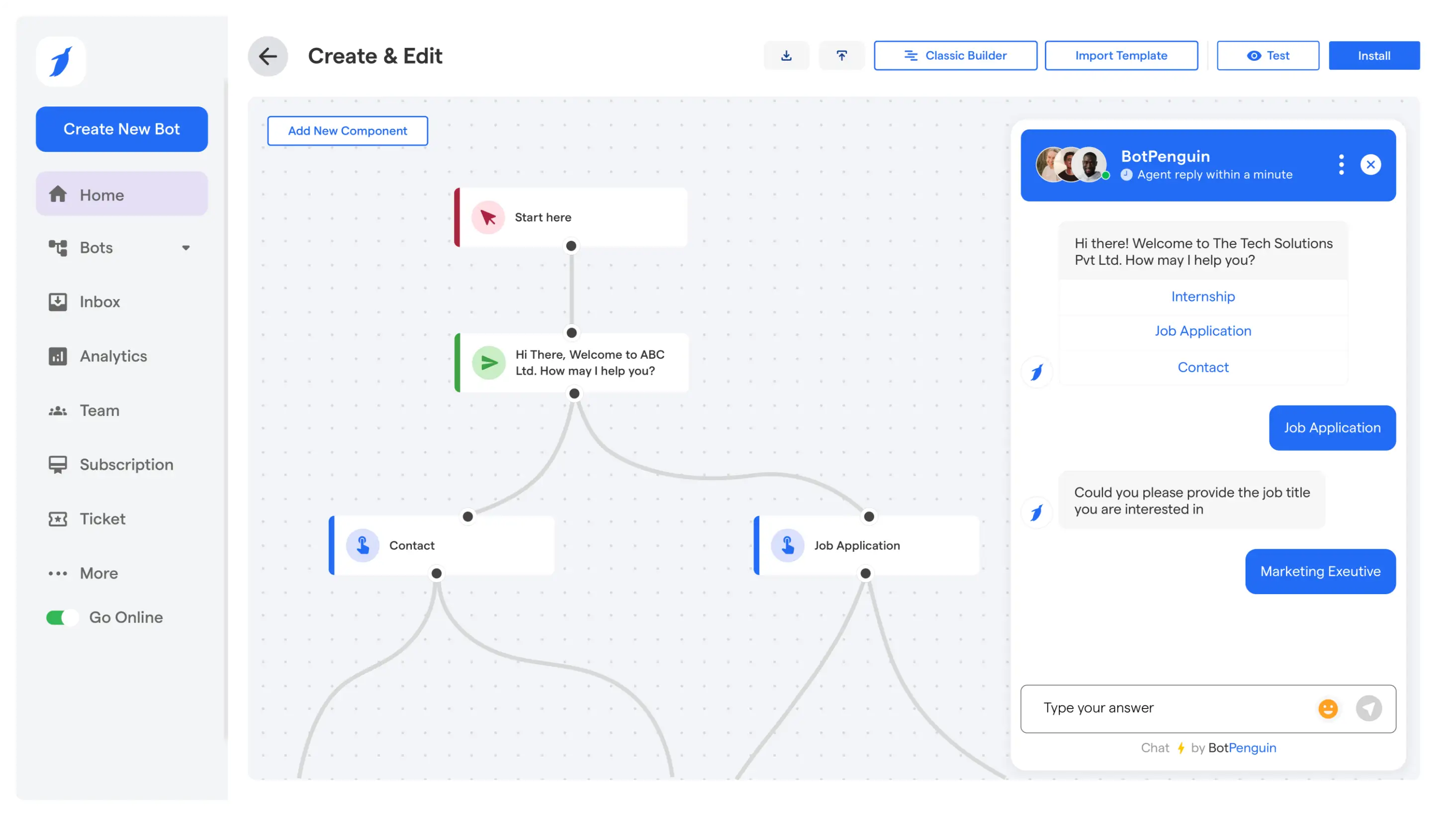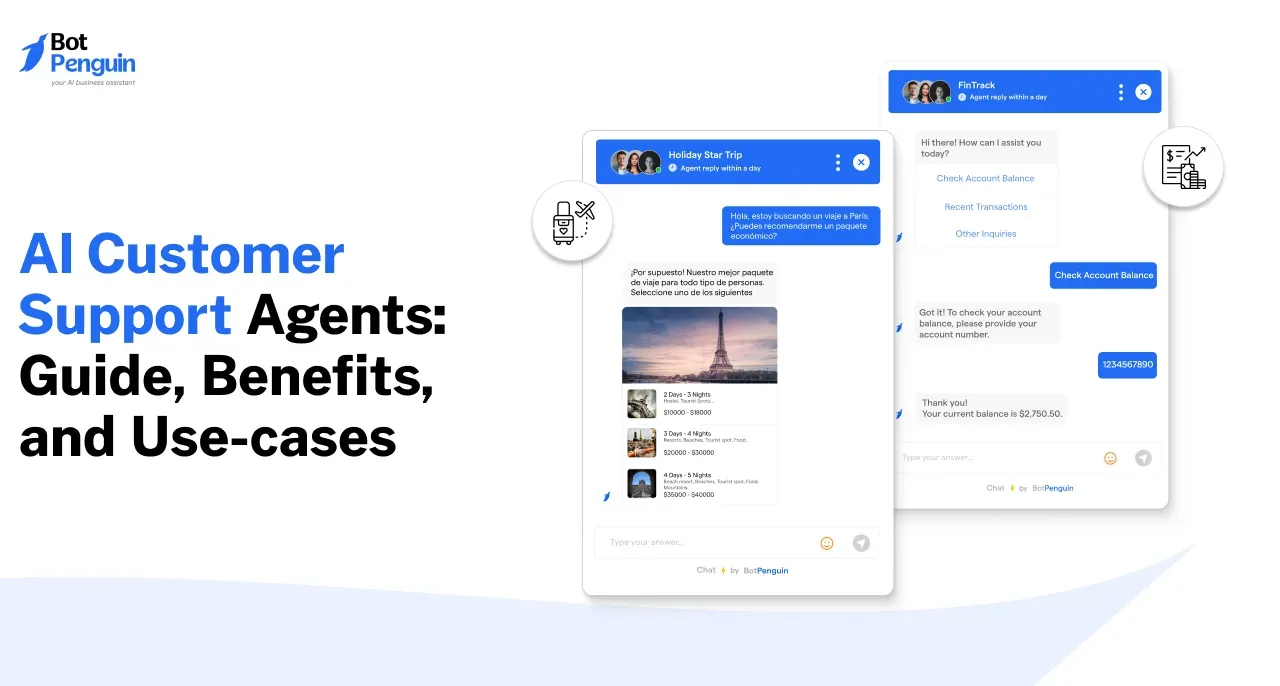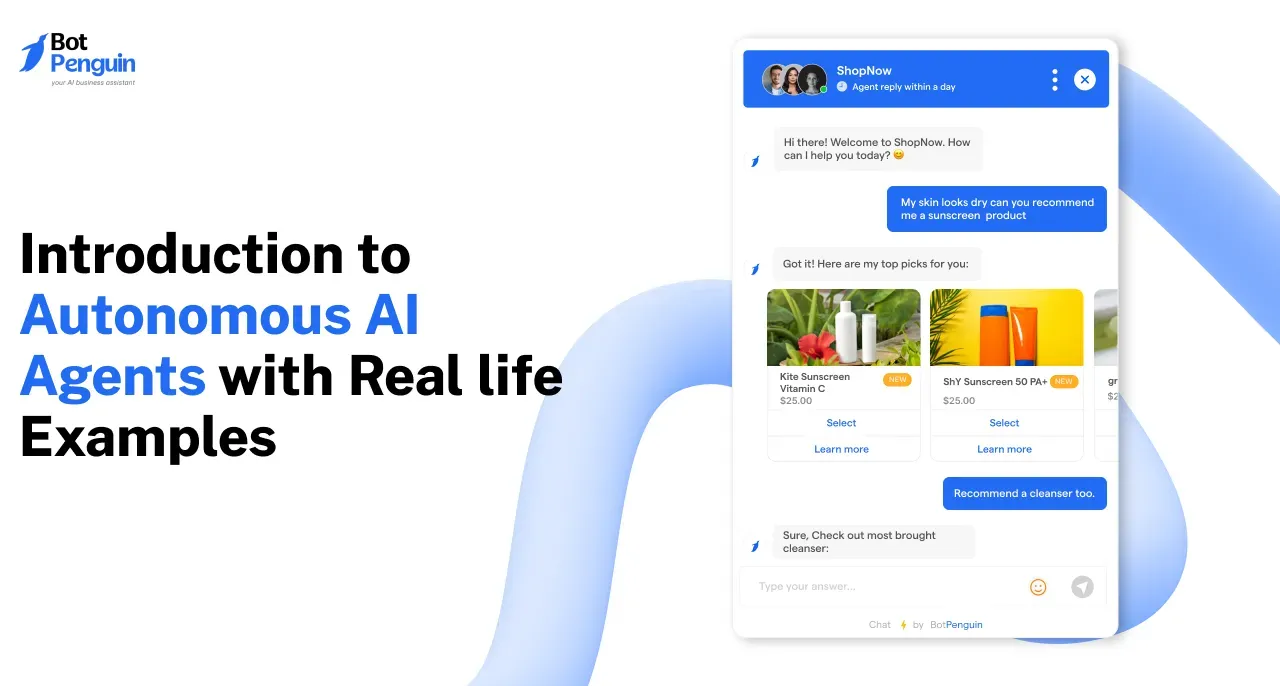AI agents are transforming how modern businesses operate. They’re helping teams automate everyday operations, make smarter decisions, and manage customer interactions effortlessly.
Across industries, more companies are turning to AI agent tools to boost productivity and simplify business automation. But with so many options available, choosing the right one can be confusing.
The right tool can save hours of manual work and improve performance, while the wrong one can slow you down.
This guide brings you the Top 10 Best AI Agent Tools for 2025. Each platform has been reviewed against ten essential factors like capabilities, integrations, usability, reliability, and pricing so you can confidently find the AI tools for automation that truly fit your business needs.
What are AI Agent Tools?
AI agent tools are intelligent systems that can think, decide, and act with minimal human input. They are designed to perform end-to-end tasks by analyzing data, interpreting goals, and executing actions in real time.
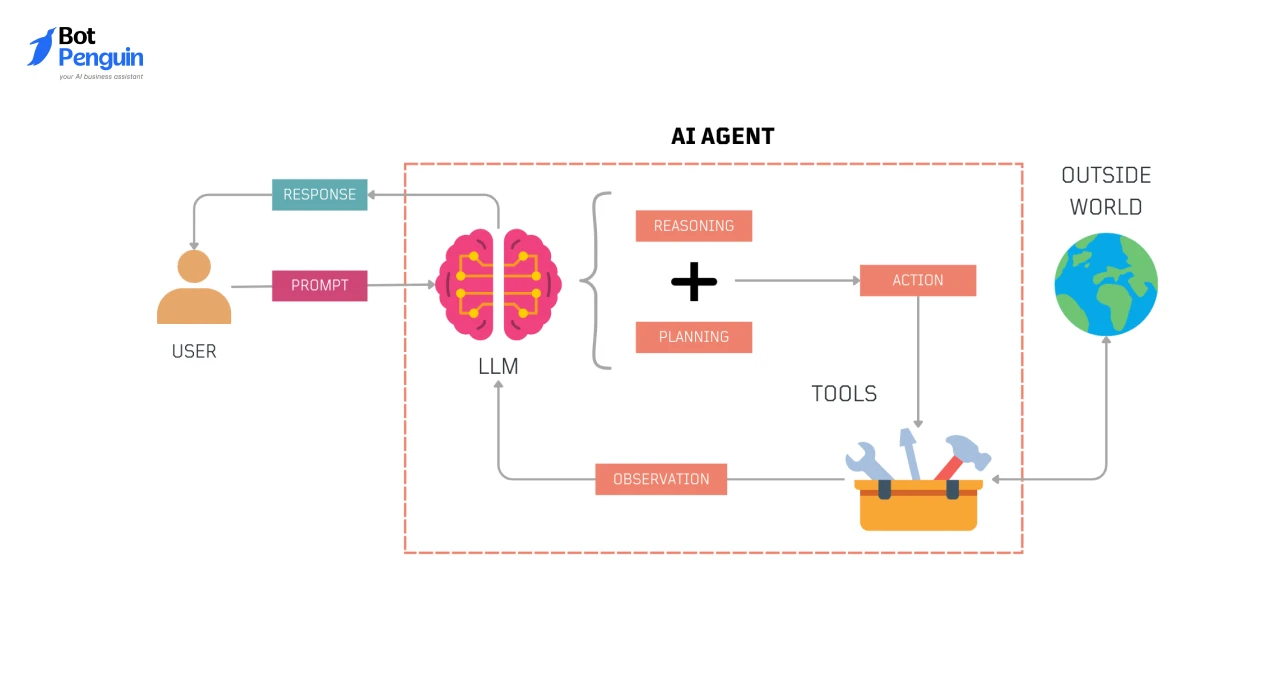
Unlike rule-based bots that follow predefined commands, these systems adapt to changing conditions and learn from every interaction.
AI agents are not limited to one task. They can analyze conversations, schedule tasks, update CRM records, or generate reports automatically. This adaptability makes them vital for modern business environments that rely on speed and precision.
How AI Agent Tools Work
At their core, AI agent tools use large language models (LLMs) and machine learning to process natural language, understand intent, and make logical decisions. These systems combine AI reasoning with integrations across CRMs, help desks, marketing software, and data systems to create unified business AI systems.
For instance, an autonomous AI agent in customer service can detect a complaint, pull related order details, and respond with a resolution instantly. In operations, another agent can track workflow progress, send updates, and optimize schedules without human guidance.
AI Agent Tools vs Traditional Automation
Traditional automation tools rely on fixed rules and scripts. They execute only what is pre-defined. In contrast, AI automation tools use contextual understanding, pattern recognition, and decision-making abilities to handle complex workflows that evolve continuously.
These agents can work across departments, reduce manual effort, and maintain consistency without supervision. This shift from static automation to intelligent automation marks a major advancement in business process efficiency.
Why AI Agents Matter Today
AI agents are becoming the foundation of intelligent operations. They handle multi-step workflows, deliver faster results, and continuously learn to improve accuracy.
As more businesses adopt these systems, automation is moving from repetitive task handling to smart execution driven by data and reasoning.
Understanding the structure and capabilities of AI agents helps explain why their adoption is increasing rapidly. The next section explores how organizations are integrating AI agents to enhance productivity, improve decision-making, and achieve large-scale automation.
Why Businesses are Turning to AI Agents
Organizations are moving from rule-based automation to intelligent decision-making systems.
The demand for AI business automation is driven by the need to manage larger workloads, reduce response times, and deliver consistent results across departments.
Businesses today need tools that can execute complex tasks without constant monitoring, and AI agents are filling that gap.
These systems analyze data in real time, adapt to new inputs, and coordinate multiple workflows simultaneously.
According to a recent market report, over 65 percent of enterprises plan to deploy automation tools for businesses powered by AI within the next two years. This adoption reflects a growing trust in intelligent automation as a productivity multiplier.
Driving Efficiency and Productivity
AI agents improve operational performance by handling repetitive processes such as support tickets, lead routing, and data updates.
Teams save time by allowing agents to complete tasks instantly, freeing staff for strategy and decision-making. Unlike manual automation systems, AI agents manage operations continuously with precision and adaptability.
Companies also benefit from real-time decision-making. For example, a retail AI agent can analyze purchase behavior during checkout and instantly adjust discounts or recommendations. This speed and accuracy directly improve both efficiency and customer experience.
Scalability and Integration Flexibility
Scalability is a major reason for AI agent growth. Businesses can deploy one agent or hundreds depending on workflow complexity, without restructuring systems.
Integration flexibility allows agents to connect with CRM, ERP, and communication platforms, ensuring uninterrupted operations across departments.
Enterprises are recognizing these AI agent benefits not as optional enhancements but as essential components of modern digital infrastructure.
The next section explains how these tools are evaluated and what criteria define the most effective AI agents in business automation today.
How We Evaluated the Best AI Agent Tools
Selecting the right platform for AI agent comparison requires more than looking at features or pricing. Businesses depend on these tools to handle critical functions such as sales, customer support, and operations.
To ensure accuracy, each tool was tested against practical, measurable criteria that reflect how companies actually use automation in real-world environments.
The evaluation focused on performance, adaptability, and sustainability over time. Each platform was reviewed across ten core areas that influence both technical strength and business value.
This structured approach ensures that our AI agent review provides actionable insights for decision-makers comparing multiple solutions for automation and scalability.
1. Core Capabilities
We examined how effectively each AI agent tool performs complex automation tasks. This includes handling decision-making, managing multi-step workflows, and delivering accurate responses in real time.
A strong platform must manage tasks such as lead qualification, data updates, or customer queries without failure.
2. Integrations and Ecosystem
An AI tool’s strength depends on how well it connects with the wider business environment. Integration with CRMs, marketing platforms, ERPs, and communication tools is crucial.
The best tools offer ready connectors and open APIs to support custom use cases, allowing complete automation across departments.
3. Ease of Use (No-Code Support)
Many organizations prefer tools that do not require deep technical expertise. We tested each tool’s setup process, onboarding flow, and visual builders to understand how quickly teams can deploy AI agents.
Platforms with no-code or low-code interfaces were rated higher for accessibility and faster implementation.
4. Customization and Flexibility
Every business operates differently. Tools were assessed on how easily users can define prompts, rules, or behavior for agents.
Custom branding options, role-based access, and multilingual configuration were also considered, since adaptability drives long-term usability.
5. Performance and Reliability
Operational consistency is a key part of AI automation criteria. Each tool was evaluated for uptime, speed, and stability under workload pressure.
Latency during complex tasks or high message volumes can directly affect user satisfaction and automation ROI.
6. Analytics and Monitoring
Visibility into agent performance is essential for improvement. We assessed the availability of real-time analytics, error logs, and performance dashboards.
Tools that provided measurable KPIs and reporting dashboards scored higher for transparency and optimization potential.
7. Security and Compliance
Data integrity remains a top concern in automation. Each solution was checked for security certifications such as GDPR, SOC 2, or ISO readiness.
Role-based permissions, encryption methods, and audit logs were also reviewed to ensure safe operation in regulated industries.
8. Pricing and Value
The evaluation included a detailed analysis of pricing structures, scalability limits, and cost transparency. Platforms that balanced affordability with robust automation capabilities ranked higher.
Value was determined not only by subscription cost but also by the measurable impact on productivity and time savings.
9. Support and Documentation
Effective customer support is critical for deployment and troubleshooting. Each tool’s documentation, AI Agent training materials, and support availability were reviewed.
Platforms with active customer success teams, tutorials, and technical forums earned higher ratings.
10. Social Proof and Credibility
Finally, adoption trends, verified reviews, and case studies were analyzed to determine long-term trust and reliability.
Solutions with strong user feedback, active communities, and proven enterprise use cases stood out as leaders in the best AI agent tools evaluation.
Comparison Table: Best AI Agent Tools at a Glance
The following AI automation tool matrix provides a summarized AI agent comparison of the ten platforms evaluated above. Each platform is compared across functionality, usability, integrations, and compliance readiness.
This best AI agent tools list helps decision-makers identify which tool aligns best with their business size, goals, and technical requirements.
Key Insights from the Comparison
- Most Accessible Platform: BotPenguin stands out for its no-code design, enterprise-grade compliance, and 80+ integrations.
- Best for Developers: AutoGPT and AgentGPT offer flexibility and API-driven customization for advanced users.
- Enterprise Leaders: Kore.ai and Cognosys excel in scalability, compliance, and workflow automation.
- Best for Teams: Taskade AI Agents integrates collaboration with automation in one workspace.
- Most Personalized: Personal.ai brings memory-based customization and privacy-first automation.
- Best for Finance: Aider delivers domain-specific automation for accountants and financial advisors.
This comparison provides a clear overview of where each tool excels, allowing businesses to select the best AI agent tools that match their scale, technical comfort, and automation priorities.
The next section introduces the leading AI agent tools in detail that performed best across these evaluation criteria, highlighting their distinct strengths and practical use cases for business automation.
Top 10 AI Agent Tools
AI agents are reshaping how businesses operate by handling complex tasks, analyzing data, and communicating across multiple channels without manual input.
They enable real-time decision-making, automate workflows, and enhance productivity across departments.
The following are the top AI agent tools driving this transformation, each offering unique capabilities that help organizations scale smarter, respond faster, and work more efficiently.
1. BotPenguin – All-in-One AI Agent Platform for Every Business
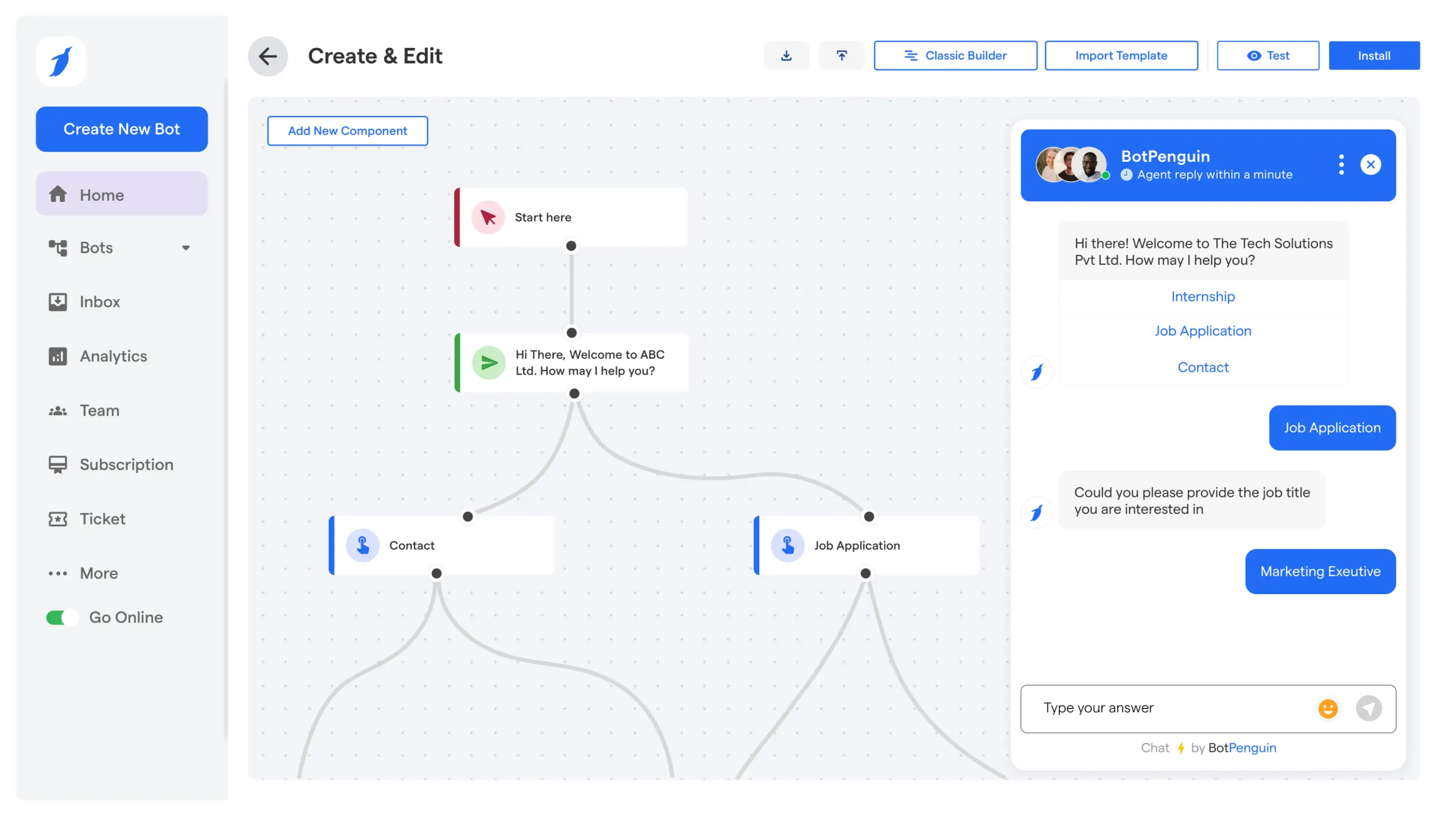
BotPenguin is a robust no-code AI automation platform designed for startups, SMBs, and enterprises looking to deploy intelligent AI agents quickly.
It supports multiple large language models such as GPT, Claude, and Gemini, and connects with more than 80 tools including CRMs, messaging apps, and analytics platforms.
The platform also provides white-label options, making it suitable for resellers and agencies.
With built-in GDPR and SOC 2 compliance, BotPenguin delivers enterprise-level security and reliability while remaining accessible to non-technical users.
Key Features
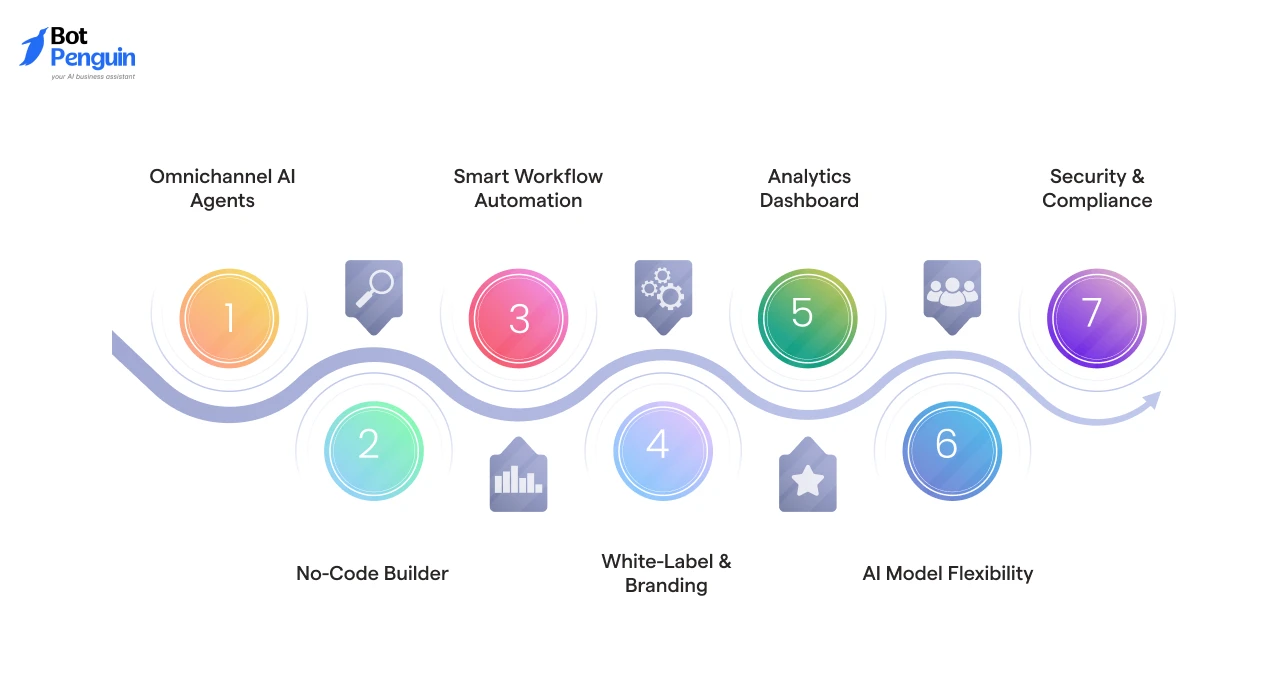
- Omnichannel AI Agents: Deploy agents across WhatsApp, Instagram, Telegram, Website, and Facebook Messenger.
- No-Code Builder: Drag-and-drop interface for building chat and voice agents without coding.
- Smart Workflow Automation: Integrate with CRMs like HubSpot, Zoho, and Pipedrive to automate lead qualification and ticket management.
- White-Label & Branding: Customize logos, domains, and dashboards for reselling opportunities.
- Analytics Dashboard: View agent performance metrics, conversation history, and customer engagement analytics.
- AI Model Flexibility: Choose from multiple AI models for different automation contexts.
- Security & Compliance: GDPR and SOC 2 ready, with role-based access and data encryption.
Use Cases
- Customer Support: Auto-respond to FAQs, complaints, and order tracking queries.
- Sales & Lead Generation: Capture, qualify, and route leads to sales teams instantly.
- E-commerce Assistance: Manage cart reminders, abandoned orders, and product recommendations.
- CRM Automation: Sync data, update deals, and assign tasks automatically through integrations.
- Ticketing & Helpdesk: Convert customer chats into actionable tickets linked to CRM workflows.
Pros
✅ Easy to use with a no-code setup and AI templates
✅ 80+ integrations with popular apps and CRMs
✅ Offers white-label capabilities for agencies and resellers
✅ Fully GDPR and SOC 2 compliant for enterprise use
✅ Supports multi-model AI for diverse automation needs
✅ Responsive support and onboarding team
Cons
❌ Limited developer-focused customization compared to open-source tools
❌ Advanced analytics features are available only in higher-tier plans
❌ Requires setup understanding for complex workflows despite being no-code
Best For
- Startups looking for quick automation without hiring developers
- Agencies wanting to offer branded AI automation services
- SMBs aiming to centralize customer support and sales workflows
- Enterprises needing compliance-ready omnichannel automation
Our Evaluation Ratings (Out of 5)
Final Verdict
BotPenguin AI Agents stand out for combining simplicity, flexibility, and enterprise readiness in one platform. It’s ideal for businesses seeking no-code AI automation without compromising on integrations, compliance, or scalability.
Whether automating customer interactions, managing workflows, or building branded AI solutions, BotPenguin delivers measurable value across all departments.
Up next is AgentGPT, an automation tool built for developers and advanced users who prefer creating autonomous, task-driven AI agents capable of executing complex goals independently.
2. AgentGPT – Autonomous Task Execution for Developers and Innovators
AgentGPT is one of the most recognized platforms for building autonomous AI agents that execute multi-step tasks without manual intervention.
Designed primarily for developers and advanced users, it allows you to create agents that can plan, reason, and act toward a defined goal. AgentGPT runs directly in the browser and connects with OpenAI’s GPT models, enabling complex automation through natural language commands.
Users can input a task such as “research new market trends and summarize key findings,” and the agent will independently execute subtasks until completion. It is particularly popular among users testing the limits of AI automation in research, data processing, and experimental workflows.
Key Features
- Autonomous Goal Execution: AI agents can plan, execute, and monitor progress toward objectives.
- Browser-Based Interface: Build and deploy agents directly from the browser without installation.
- Task Chaining: Agents can create subtasks and complete them sequentially based on results.
- Integration Flexibility: Works with GPT models via API keys and supports integration into custom setups.
- Real-Time Progress Tracking: View logs, execution steps, and completion reports in real time.
- Open-Source Access: Developers can modify the codebase to create advanced agent behaviors.
- Multi-Goal Support: Capable of handling multiple independent workflows simultaneously.
Use Cases
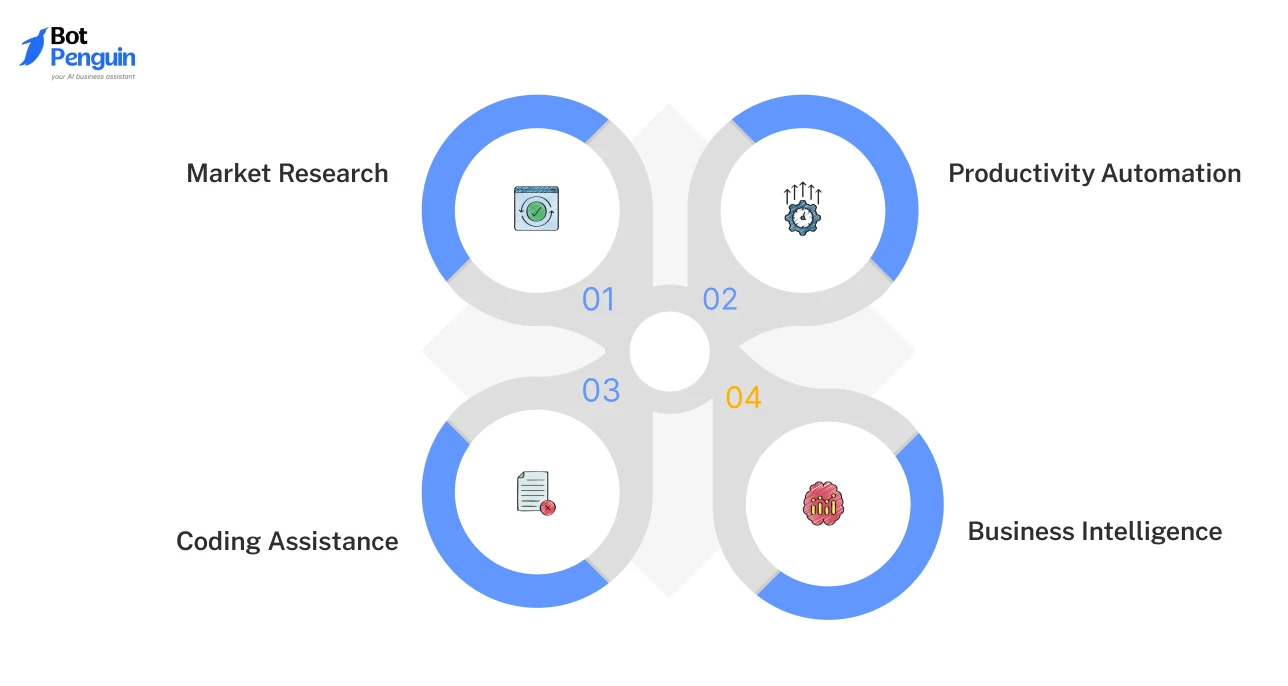
- Market Research: Automate data gathering and summarization across multiple web sources.
- Productivity Automation: Create agents to write reports, generate summaries, or extract data insights.
- Coding Assistance: Generate structured code snippets or documentation through goal-oriented automation.
- Business Intelligence: Automate trend analysis and competitor tracking through autonomous agents.
Pros
✅ Fully autonomous AI agent creation for complex, multi-step tasks
✅ Open-source flexibility for developers to customize and extend functionality
✅ Requires no installation and runs in the browser
✅ Ideal for testing AI agent capabilities and experimental workflows
✅ Transparent process logging for debugging and monitoring
Cons
❌ Limited integrations with third-party platforms by default
❌ Requires technical knowledge and OpenAI API key setup
❌ No built-in compliance or enterprise-grade data security
❌ Can be resource-intensive for long-running tasks
Best For
- Developers and researchers exploring autonomous agent logic
- Tech startups experimenting with AI-driven task automation
- Advanced users seeking flexible, customizable AI workflows
- Data and research teams needing fast iterative testing
Our Evaluation Ratings (Out of 5)
Final Verdict
AgentGPT is a powerful choice for professionals who want full control over how AI agents think and operate. It excels in flexibility, experimentation, and autonomous execution but requires technical setup and maintenance.
Ideal for development teams and AI enthusiasts, it’s best used as a sandbox for innovation rather than a plug-and-play automation system.
Next, we move to AutoGPT, a developer-focused framework that builds on similar principles but adds deeper customization, memory features, and broader integration possibilities for advanced automation.
3. AutoGPT – Developer-Friendly AI Agent Builder
AutoGPT is one of the most influential developer AI tools in the agent ecosystem, designed to create advanced reasoning chains and execute multi-step automation workflows.
It enables developers to build autonomous systems that plan, analyze, and perform complex operations with minimal human input. AutoGPT connects with APIs, databases, and external applications, giving it significant flexibility for real-world use cases like market analysis, product research, and process optimization.
Unlike plug-and-play AI platforms, AutoGPT functions as an open-source framework that allows deep customization. It’s built on top of GPT models and can handle task planning, memory management, and iterative decision-making.
Developers can program it to pursue specific objectives, gather data, and continuously refine actions based on feedback loops.
Key Features
- Chained Reasoning Framework: Enables agents to complete multi-step logical workflows autonomously.
- API Integration: Supports direct API calls for data retrieval, app connections, and custom function execution.
- Memory Management: Stores previous interactions for improved context awareness.
- Custom Scripting: Developers can define prompts, goals, and conditional responses through configuration files.
- Local and Cloud Deployment: Offers flexibility for different environments based on security and performance needs.
- Task Looping: Agents can self-verify results and reattempt incomplete objectives automatically.
- Open-Source Community: Supported by an active global developer network contributing regular enhancements.
Use Cases
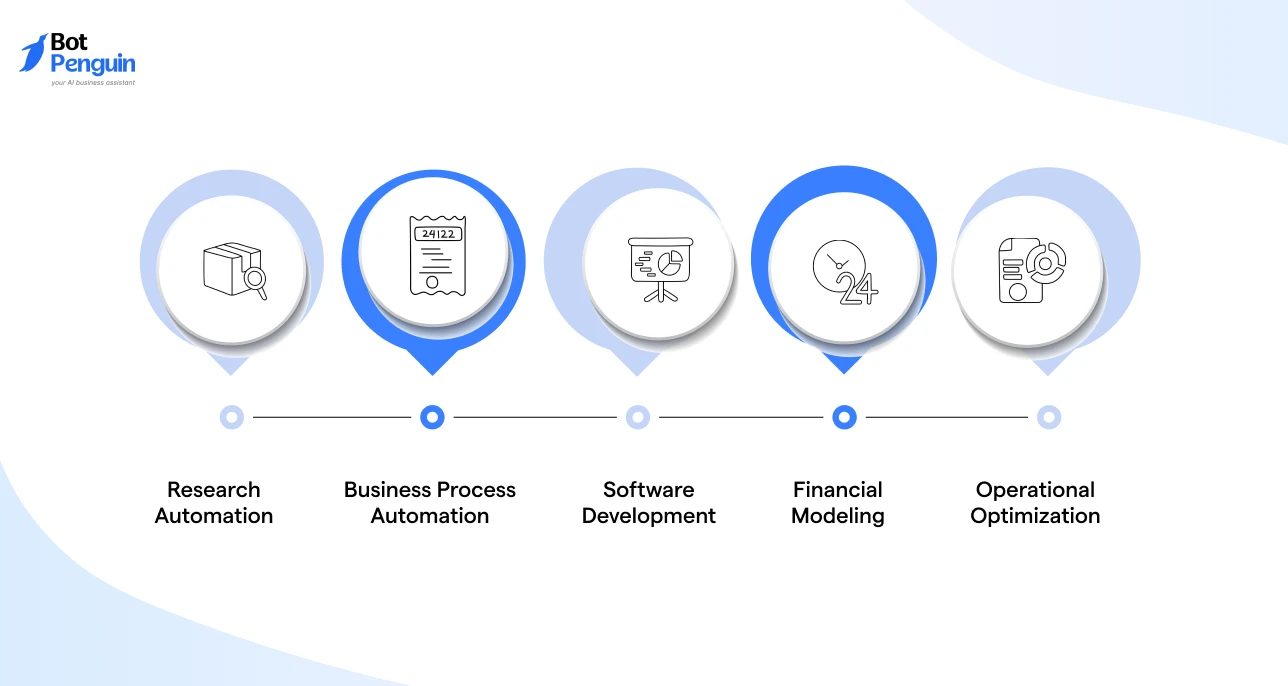
- Research Automation: Gather and summarize online data from multiple sources for reports or intelligence briefs.
- Business Process Automation: Automate repetitive back-end workflows such as data entry, validation, and reporting.
- Software Development: Build code review and generation pipelines with context awareness.
- Financial Modeling: Fetch and process financial data for insights, forecasting, and analysis.
- Operational Optimization: Coordinate workflow execution between tools and track task progress automatically.
Pros
✅ Open-source and fully customizable framework for developers
✅ Supports AI workflow automation with advanced reasoning loops
✅ Integrates directly with APIs and third-party applications
✅ Strong community support with continuous feature updates
✅ Flexible for both research and production-level implementations
Cons
❌ Requires strong technical knowledge to set up and maintain
❌ No graphical interface or no-code features for general users
❌ Lacks built-in compliance or enterprise-level security controls
❌ Can be resource-intensive when running on local systems
Best For
- Developers building complex autonomous workflows with high flexibility
- AI researchers experimenting with reasoning and memory in agent systems
- Technology companies needing custom internal automation solutions
- Data engineers integrating AI pipelines into analytics and business systems
Our Evaluation Ratings (Out of 5)
Final Verdict
AutoGPT is ideal for developers who want complete control over their automation logic. It’s not designed for casual users but for teams building custom AI workflows that require iterative reasoning and deep integration. Its open-source foundation and strong community make it a leading tool in AI workflow automation.
Next, we review Taskade AI Agents, a platform built for collaborative teams that combines task management, workflow execution, and real-time automation within a unified workspace.
4. Taskade AI Agents – Smart Agents Embedded in a Productivity Workspace
Taskade brings project planning, team collaboration, and automation together in a unified workspace.
Its AI Agents feature allows users to build intelligent assistants that automate repetitive tasks, analyze data, and participate in ongoing team workflows.
These agents operate within the same environment as the projects, drawing from workspace data and user-defined knowledge to deliver relevant, context-aware responses.
Users can train Taskade AI Agents with project data, assign them roles, and deploy multiple agents that collaborate on tasks such as research, writing, or organizing workflows.
The system supports both individual and team-based automation, making it useful for companies that manage complex projects or recurring business processes.
Key Features
- Custom AI Agents: Create tailored agents for research, support, or content creation based on your team’s needs.
- Agent Generator: Describe a goal or process, and Taskade automatically generates a functional agent template.
- Automation Flows: Combine agents with task triggers, recurring events, and schedules for complete automation.
- Memory and Knowledge: Train agents with project data, uploaded files, or workspace information for better context awareness.
- Multi-Agent Collaboration: Create teams of agents that handle specialized roles within larger workflows.
- Integrations and APIs: Connect agents to over 100 services such as Slack, Gmail, and Google Sheets for cross-platform operations.
- Embedding and Branding: Premium users can embed agents into websites or custom dashboards and manage branding options.
Use Cases
- Automate project planning by generating and prioritizing task lists.
- Summarize meeting notes and extract action points for follow-up.
- Generate content outlines, blog drafts, or creative briefs based on stored data.
- Provide quick access to internal documents and company FAQs.
- Manage workflow updates and synchronize data across different tools.
Pros
✅ AI agents fully integrated within the team workspace environment
✅ Customizable memory and training options for context-rich automation
✅ Multi-agent setup for parallel work and role-based execution
✅ Extensive integrations and workflow automation options
✅ Real-time collaboration features across web and mobile
Cons
❌ Advanced agent customization features require a paid plan
❌ Requires setup time to fine-tune automations and agent behaviors
❌ Usage limits depend on subscription tier and credit allocation
Best For
- Teams wanting to integrate automation directly into their existing task management tools
- Knowledge workers managing multiple collaborative projects
- Productivity-focused organizations looking for context-aware automation
- Startups and SMEs needing both collaboration and AI support in one workspace
Our Evaluation Ratings (Out of 5)
Final Verdict
Taskade AI Agents excel at combining intelligent automation with collaboration, making them ideal for teams that want automation within a shared workspace.
The integration of memory and contextual understanding enhances productivity without requiring users to switch platforms.
Its flexibility, simplicity, and scalability make it a strong choice for teams seeking structured AI workflow automation with real collaborative value.
Next, we will explore Chatbase, an AI platform focused on conversational automation and customer support intelligence.
5. Chatbase – Conversational AI Agents for Customer Engagement
Chatbase is a specialized AI automation platform designed to help businesses build intelligent conversational agents trained on their own data.
It enables users to create chatbots that understand context, recall previous interactions, and provide accurate responses across multiple channels.
Unlike generic bots, Chatbase allows companies to upload documents, knowledge bases, and website data so the AI can answer with verified, brand-specific information.
Chatbase is widely adopted by startups and enterprises that need reliable, 24/7 customer interaction automation. Its intuitive setup process, flexible integrations, and scalable performance make it one of the most practical solutions for AI-driven business communication.
Key Features
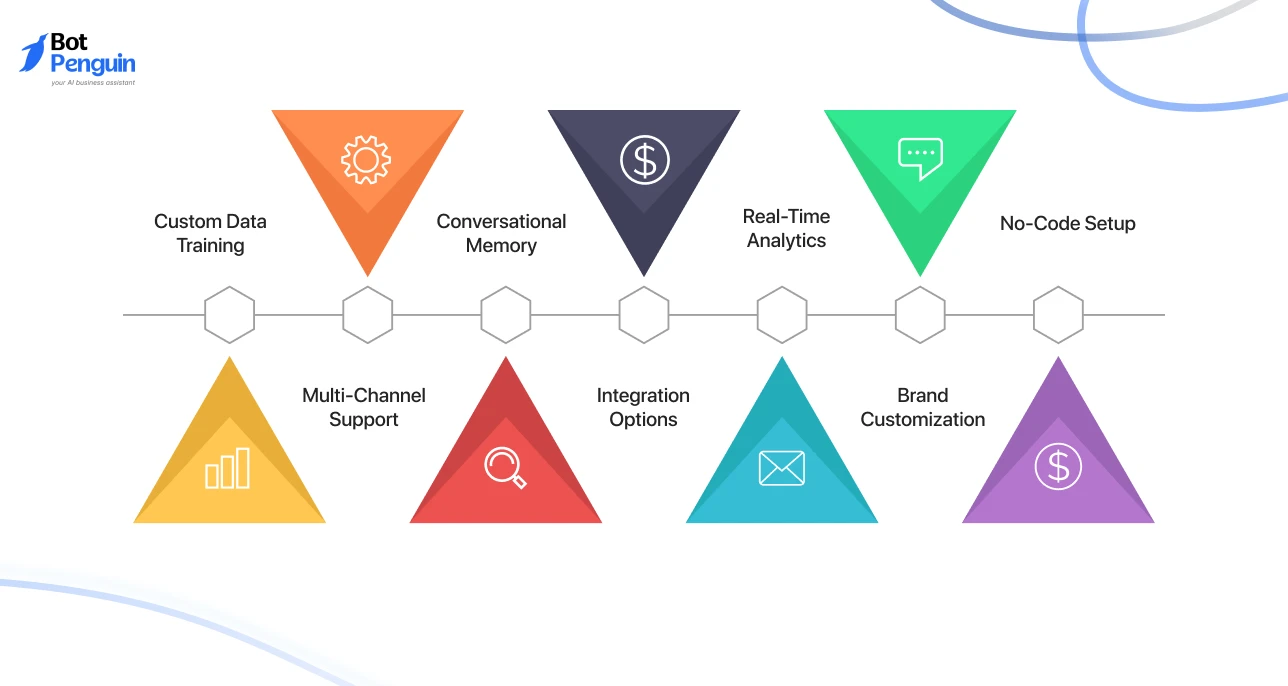
- Custom Data Training: Upload files, URLs, or text data to train the AI on company-specific information.
- Multi-Channel Support: Deploy chatbots on websites, WhatsApp, Facebook Messenger, or any embedded widget.
- Conversational Memory: The AI retains context throughout a conversation, improving continuity and accuracy.
- Integration Options: Works with CRMs, CMS tools, and analytics software through API and third-party connectors.
- Real-Time Analytics: Track chat volume, user queries, response quality, and satisfaction metrics.
- Brand Customization: Configure design, tone, and conversation style to match your brand’s voice.
- No-Code Setup: Build and train bots without technical experience using a guided builder.
Use Cases
- Customer Support: Automate FAQs, ticket triaging, and basic troubleshooting for instant response times.
- Sales Enablement: Engage website visitors, qualify leads, and direct prospects to human agents when needed.
- Internal Knowledge Assistant: Provide quick answers to employee queries from internal documentation.
- Content Interaction: Train the chatbot on blogs, guides, or manuals to help users find relevant information easily.
- Service Booking: Schedule demos, appointments, or consultations directly through the chatbot interface.
Pros
✅ Intuitive no-code AI builder for non-technical users
✅ Custom knowledge training with support for multiple file types
✅ Responsive and natural conversation flow with memory support
✅ Detailed analytics and performance tracking for optimization
✅ Integration-ready for CRM and marketing platforms
Cons
❌ Free plan has limited queries per month
❌ Advanced features like API integrations and white-labeling are available in higher-tier plans
❌ Response customization requires some manual fine-tuning for accuracy
❌ Limited team collaboration features compared to project-based tools
Best For
- Customer support teams automating inquiries and responses
- Marketing and sales departments aiming to improve lead capture and engagement
- Startups and SMBs seeking an affordable, ready-to-launch conversational AI
- Enterprises looking to deploy secure, scalable chatbots trained on internal data
Our Evaluation Ratings (Out of 5)
Final Verdict
Chatbase stands out among conversational AI tools for its simplicity and data-driven customization. Businesses can train chatbots on their unique content, ensuring precise and relevant interactions with customers.
Its mix of no-code usability, strong analytics, and broad integration potential makes it an excellent fit for support, sales, and marketing teams looking to enhance engagement while reducing workload.
Next, we’ll move to Kore.ai, a platform built for enterprise-level automation and omnichannel conversational AI with advanced analytics, scalability, and security.
6. Kore.ai – Enterprise-Grade Conversational and Process Automation Platform
Kore.ai is a leading enterprise AI automation platform that enables organizations to deploy conversational and process automation at scale.
It combines conversational AI, workflow automation, and natural language understanding (NLU) to help businesses deliver consistent experiences across multiple communication channels.
Kore.ai’s platform supports chat, voice, and digital interactions, allowing teams to automate customer service, HR, IT, and operations with high precision.
Recognized by Gartner and Forrester as a top enterprise solution, Kore.ai offers tools for developers and non-technical users through its Dialog Studio and low-code builder.
Its AI agents can interact with employees and customers through WhatsApp, websites, IVR systems, or internal enterprise apps, making it one of the most versatile AI business automation solutions available.
Key Features
- Omnichannel Automation: Deploy AI agents across chat, voice, and email platforms with unified control.
- Advanced NLU Engine: Context-aware language processing for accurate, human-like responses.
- Dialog Studio: Low-code interface for building workflows, dialog trees, and automation logic.
- Process Discovery and Analytics: Identify automation opportunities through workflow mapping and performance tracking.
- AI Model Customization: Train AI on business data for tailored responses and contextual understanding.
- Voice and IVR Support: Build intelligent voice bots for call centers and internal communications.
- Enterprise Security: SOC 2, ISO 27001, and GDPR compliance with role-based access controls.
- Integrations: Works with Salesforce, ServiceNow, Oracle, SAP, Zendesk, and other enterprise systems.
Use Cases
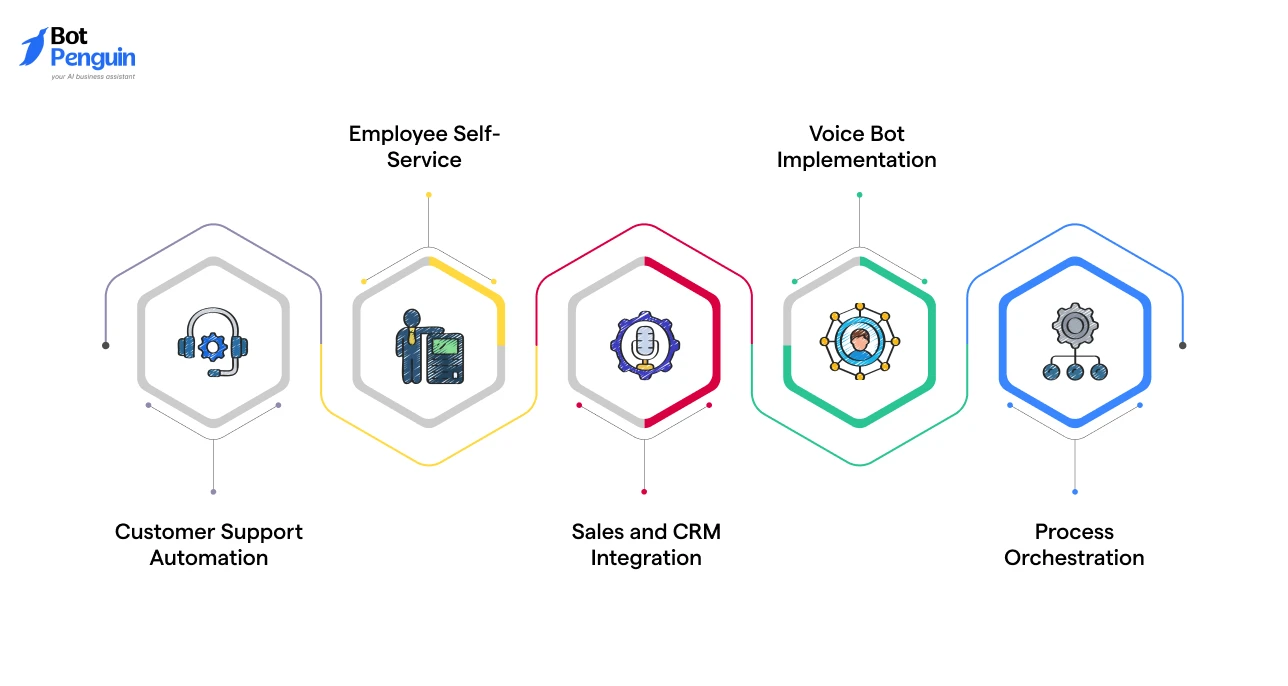
- Customer Support Automation: Manage complex support requests and escalation workflows through AI chat and voice agents.
- Employee Self-Service: Automate HR and IT helpdesk functions to resolve common employee queries.
- Sales and CRM Integration: Provide real-time customer updates and lead insights via connected CRMs.
- Voice Bot Implementation: Handle inbound calls and route queries intelligently through AI-powered IVR systems.
- Process Orchestration: Combine AI decision-making with process automation for end-to-end operational efficiency.
Pros
✅ Enterprise-level compliance and data security certifications
✅ Scalable platform for large organizations with high interaction volumes
✅ Supports both no-code and developer customization environments
✅ Advanced conversational analytics and process optimization tools
✅ Flexible deployment options including cloud and on-premise setups
Cons
❌ Complex for smaller teams without technical expertise
❌ Higher implementation cost compared to SMB-focused tools
❌ Requires training to fully utilize advanced NLU and automation modules
❌ Limited free plan; primarily targeted toward mid to large enterprises
Best For
- Enterprises and large organizations seeking scalable AI automation solutions
- Customer experience teams managing high support volumes across multiple channels
- IT and HR departments looking to automate internal workflows
- Enterprises needing compliance, customization, and multilingual capabilities
Our Evaluation Ratings (Out of 5)
Final Verdict
Kore.ai stands as one of the most powerful platforms for enterprise-grade conversational and process automation.
It combines scalability, compliance, and intelligence, making it ideal for organizations seeking complete control over customer and employee experiences. While best suited for large enterprises, its flexibility and automation depth make it a benchmark in the AI agent tools landscape.
Next, we will look at Cognosys, a platform focused on data-driven automation and backend workflow optimization for business intelligence and process management.
7. Cognosys – AI Agents for Process Intelligence and Workflow Automation
Cognosys is an advanced AI agent platform built to help enterprises streamline operations through intelligent automation and data-driven decision-making.
Positioned at the intersection of AI and business process optimization, Cognosys focuses on enabling businesses to automate backend workflows, analyze performance metrics, and enhance productivity with intelligent process agents.
The platform integrates AI-driven analytics, machine learning, and automation orchestration to create agents capable of understanding context, detecting inefficiencies, and executing improvements automatically.
Cognosys provides businesses with a unified environment to manage automation across departments, from finance and logistics to customer service and compliance monitoring.
Key Features
- AI Process Intelligence: Automatically identifies process gaps, delays, and inefficiencies through real-time analytics.
- Workflow Automation: Build intelligent workflows that handle repetitive administrative tasks end to end.
- Data-Driven AI Agents: Leverage analytics to make predictions, generate reports, and optimize process performance.
- Integration Suite: Connects with ERP, CRM, and business applications like SAP, Salesforce, and ServiceNow.
- Custom AI Model Training: Tailor models for specific use cases such as fraud detection, order management, or forecasting.
- Visual Dashboard: Centralized analytics dashboard for KPI monitoring and process health tracking.
- Scalable Cloud Infrastructure: Supports hybrid and cloud-native deployment for flexible enterprise adoption.
Use Cases
- Financial Operations: Automate invoice processing, expense tracking, and payment validation.
- Supply Chain and Logistics: Monitor shipments, predict bottlenecks, and manage vendor communications automatically.
- Customer Service Automation: Enable AI-driven issue resolution and escalation workflows.
- Compliance and Risk Management: Detect policy violations and ensure audit readiness.
- Reporting and Insights: Generate real-time dashboards for management and operational teams.
Pros
✅ Combines process automation with powerful analytics and decision-making
✅ Supports enterprise-grade integrations with business-critical systems
✅ Allows tailored AI model training for industry-specific needs
✅ Provides strong visualization tools for tracking process KPIs
✅ Scalable across departments and suitable for complex operations
Cons
❌ Focused primarily on enterprise users; not ideal for small businesses
❌ Requires initial configuration and setup support for advanced workflows
❌ Advanced AI model customization may need data science expertise
❌ Limited public pricing information; typically enterprise-contract based
Best For
- Enterprises seeking unified process automation and analytics
- Operations and finance teams managing large-scale workflows
- Organizations prioritizing efficiency, compliance, and predictive insights
- Data-driven companies looking for AI-augmented decision-making
Our Evaluation Ratings (Out of 5)
Final Verdict
Cognosys distinguishes itself with its fusion of process automation and analytical intelligence. It is ideal for enterprises that need AI agents capable of not just executing tasks but also optimizing them through continuous learning.
The platform’s strength lies in data-centric automation and predictive insights, making it a strong choice for industries like finance, logistics, and compliance.
Next, we will explore FlowGPT, a platform that democratizes AI by providing a repository of pre-built agents and workflows that users can customize and deploy instantly.
8. FlowGPT – Community-Powered AI Agents and Workflow Marketplace
FlowGPT is a fast-growing AI agent platform built around a vibrant community that shares, customizes, and deploys pre-built AI workflows.
It serves as both a prompt-sharing hub and a marketplace for ready-to-use agents that handle everything from content creation and marketing automation to customer support and data analysis.
Unlike traditional automation tools, FlowGPT empowers users to discover and replicate workflows designed by other professionals.
Its community-first approach allows businesses and individuals to experiment with automation without needing coding experience. Developers can also publish and monetize their custom-built agents.
Key Features
- Community AI Agent Marketplace: Explore and deploy pre-built AI agents for various business and personal use cases.
- Custom Workflow Builder: Create and modify agents using natural language prompts and logic-based configurations.
- AI Model Integration: Works with GPT-4, Claude, and Gemini for advanced reasoning and conversation generation.
- Collaboration Tools: Teams can share, edit, and refine automation workflows together.
- Public and Private Agents: Option to publish agents publicly or keep them private within an organization.
- Performance Metrics: Users can view upvotes, ratings, and performance feedback from the community.
- Cross-Platform Access: Cloud-based system accessible via web, with planned API integrations for external deployment.
Use Cases
- Marketing and Content Creation: Deploy AI agents that generate blogs, emails, ad copies, and social media content.
- Customer Engagement: Build chat workflows for FAQs, lead qualification, and customer onboarding.
- Education and Research: Access pre-trained research bots for summarizing and analyzing complex topics.
- Productivity Automation: Automate repetitive tasks such as meeting note summaries or report generation.
- Collaboration Workflows: Share AI processes among teams for consistent task execution.
Pros
✅ Access to thousands of pre-built AI agents created by professionals and developers
✅ No-code workflow customization with intuitive configuration
✅ Continuous innovation driven by active community feedback
✅ Multi-model support for GPT, Claude, and Gemini
✅ Ideal for users who want fast experimentation and deployment
Cons
❌ Quality of community-created agents varies by contributor
❌ Limited enterprise-grade integrations and compliance controls
❌ Advanced customization features still under development
❌ Lacks dedicated support for large-scale business workflows
Best For
- Entrepreneurs and startups exploring AI workflows without heavy investment
- Marketers and creators looking for content automation
- Educators and researchers seeking AI-powered knowledge tools
- Small teams wanting to prototype and share automation ideas quickly
Our Evaluation Ratings (Out of 5)
Final Verdict
FlowGPT stands out for its community-driven approach to AI workflow automation. It empowers users to learn, share, and deploy pre-built AI agents instantly, making it ideal for experimentation, education, and creative industries.
While not enterprise-focused, its accessibility and rapid innovation make it a top choice for teams and individuals seeking quick, practical automation without technical overhead.
Next, we will review Personal.ai, a platform centered on personalization and memory retention, helping users build AI agents that learn and communicate like their digital twin.
9. Personal.ai – Personalized Memory-Based AI Agents
Personal.ai is a unique AI agent platform designed to create personalized digital memory systems that learn from your conversations, documents, and notes.
Instead of functioning as a generic chatbot, it builds an AI “memory graph” that represents your knowledge, communication style, and experiences. This enables users to have AI agents that respond contextually — as if they were an extension of themselves.
The platform serves professionals, teams, and creators who want an assistant that understands their thought process, recalls past insights, and interacts consistently across communications.
By blending personal data storage, natural language understanding, and AI memory recall, Personal.ai redefines how AI agents can enhance human productivity and collaboration.
Key Features
- AI Memory Graph: Builds a personalized memory system that captures and organizes user data and interactions.
- Custom Training: Upload notes, documents, and messages to train the AI with your unique communication style.
- Contextual Recall: Agents can recall previous inputs and provide responses consistent with your past ideas or tone.
- Privacy-First Architecture: Data is encrypted and owned entirely by the user, ensuring information control.
- Multi-Platform Access: Works across web, mobile, and third-party messaging tools.
- Collaboration Mode: Share selected memories or allow your AI to collaborate with others while retaining boundaries.
- Continuous Learning: The AI refines itself with every conversation and input for greater personalization over time
Use Cases
- Knowledge Management: Store and retrieve ideas, notes, or past conversations quickly.
- Personal Productivity: Create summaries, write drafts, and recall project details instantly.
- Professional Communication: Respond to clients or colleagues in your personal writing style.
- Content Creation: Generate content based on your stored insights, past writing, and preferences.
- Memory Sharing: Allow selected contacts or teams to interact with your AI to transfer knowledge efficiently.
Pros
✅ Unmatched personalization using a dynamic AI memory graph
✅ Privacy-first approach with full user data control
✅ Ideal for professionals managing large volumes of knowledge
✅ Supports collaboration while protecting personal context
✅ Learns continuously and adapts to user tone and behavior
Cons
❌ Primarily focused on individual and small team use cases
❌ Limited third-party app integrations compared to enterprise AI tools
❌ Requires regular input to maintain AI memory accuracy
❌ Not suited for large-scale process automation or workflows
Best For
- Professionals and creators seeking a digital knowledge companion
- Consultants and executives managing large amounts of client or project data
- Writers and marketers maintaining consistent communication and tone
- Small teams looking to retain and transfer institutional memory efficiently
Our Evaluation Ratings (Out of 5)
Final Verdict
Personal.ai delivers one of the most advanced personalization systems among AI agent tools. It moves beyond standard automation by building a digital twin that mirrors how users think, write, and respond.
This makes it ideal for individuals and small teams looking for a reliable, memory-based assistant that enhances productivity and consistency across communications.
Next, we’ll explore Aider, an AI platform designed for accounting and financial professionals to simplify financial insights, client communication, and business decision-making.
10. Aider – AI Assistant for Accounting and Financial Management
Aider is a purpose-built AI agent platform designed for accounting firms, bookkeepers, and financial professionals. It automates data analysis, reporting, and client communication by connecting directly to accounting software and business data.
Aider acts as a digital financial assistant that interprets real-time financial metrics, answers client queries, and provides actionable insights without manual report generation.
The platform helps finance teams and advisors save time on routine tasks like cash flow monitoring, expense analysis, and performance reporting.
With its conversational AI interface, Aider transforms how accountants interact with data, offering instant answers in natural language and helping them focus on strategic advisory work rather than manual number crunching.
Key Features
- Real-Time Financial Insights: Automatically analyzes live financial data from connected accounting platforms.
- Accounting Software Integration: Works seamlessly with Xero, QuickBooks, and other popular tools.
- Conversational Interface: Allows users to ask financial questions in plain English and receive detailed, data-backed answers.
- Report Automation: Generates cash flow, profit and loss, and expense reports instantly.
- Client Communication: Enables advisors to respond to client queries quickly with accurate financial summaries.
- AI Alerts: Provides notifications for anomalies, late payments, or KPI fluctuations.
- Secure Data Handling: Implements strict access controls and encryption for all financial data.
Use Cases
- Accountants and Bookkeepers: Automate daily financial monitoring, report generation, and reconciliation.
- Financial Advisors: Deliver quick insights and personalized recommendations to clients.
- Small Businesses: Track spending, invoices, and financial performance without needing a finance team.
- Consulting Firms: Manage multiple client portfolios efficiently with AI-powered reporting.
- Finance Teams: Identify financial risks and performance trends through predictive analytics.
Pros
✅ Designed specifically for accounting and finance professionals
✅ Integrates directly with major accounting platforms
✅ Provides real-time financial visibility with natural language queries
✅ Reduces time spent on repetitive reporting and analysis
✅ Secure infrastructure suitable for handling sensitive financial data
Cons
❌ Limited to finance-focused use cases
❌ Advanced analytics and customization features available only on higher plans
❌ Not ideal for teams seeking non-financial automation
❌ Integration expansion still in progress beyond major accounting tools
Best For
- Accounting firms automating routine tasks and client updates
- Financial advisors seeking fast, data-driven insights
- SMBs needing simplified access to key business metrics
- Consultancies managing multiple client accounts in real time
Our Evaluation Ratings (Out of 5)
Final Verdict
Aider brings AI automation directly into the financial workspace, helping professionals manage data-driven tasks with greater speed and accuracy. It bridges the gap between raw financial data and strategic advisory by providing real-time insights, automated reporting, and intelligent alerts.
For accountants, financial advisors, and SMEs, Aider represents a practical, specialized solution for modern AI agent-driven financial management.
How to Choose the Right AI Agent Tool for Your Business
After reviewing the top tools, the next step is choosing which platform fits your goals and technical setup. The right AI system depends on factors such as business size, automation needs, team capability, and data sensitivity.
This section serves as an AI automation selection guide to help you narrow options based on use case and business maturity.
When choosing AI agent tools, it’s important to align the platform’s features with measurable business objectives. Consider scalability, integration depth, and usability rather than just the number of functions offered.
The goal is to adopt technology that fits into your current ecosystem and enhances productivity without creating operational complexity.
For Startups and Small Businesses
Startups often prioritize affordability, simplicity, and quick implementation. Platforms like BotPenguin and Taskade AI Agents provide ideal starting points.
BotPenguin offers no-code automation with AI chat and voice agents ready for deployment across WhatsApp, websites, and CRMs. It helps early-stage teams automate customer service, lead management, and ticketing while staying within budget.
Taskade AI Agents suits teams that already use collaborative workspaces. It embeds automation directly into projects, allowing small businesses to manage tasks and communication through AI-driven assistance.
Both tools offer free plans, making them accessible for experimentation without upfront costs.
For Enterprises and Large Organizations
Enterprises handle complex workflows and higher compliance standards, requiring scalable and secure platforms. Kore.ai and Cognosys are built specifically for these needs.
Kore.ai delivers enterprise-grade automation for customer experience, HR, IT, and operations. It supports voice and chat automation, integrates with major enterprise systems, and complies with certifications like SOC 2 and ISO 27001.
Cognosys focuses on process intelligence and workflow optimization. It uses data analytics to identify operational inefficiencies and automate backend functions.
Both solutions are ideal for enterprises that prioritize scalability, compliance, and performance monitoring.
For Developers and Technical Teams
Technical users or AI engineers looking for flexibility should consider AutoGPT. It allows developers to design autonomous AI agents capable of reasoning, executing multi-step processes, and integrating directly with APIs or external systems.
Developers can use AutoGPT to create specialized AI pipelines for research, analytics, or custom automation. The framework’s open-source nature gives full control over configurations and logic design, making it a preferred choice for experimentation and product development.
For Personalized and Knowledge-Based Automation
When personalization is the priority, Personal.ai provides a distinct approach. It creates digital memory-based agents that learn from individual data such as documents, notes, and communication history.
This allows professionals and consultants to interact with their AI assistant as an intelligent extension of their workflow.
Personal.ai helps maintain context, recall information, and generate communication consistent with the user’s tone. It is best suited for individuals and small teams looking to improve productivity and information retrieval through tailored AI experiences.
Practical Takeaway
Choosing the right tool depends on matching your automation maturity with the platform’s depth. Startups benefit from easy-to-use tools like BotPenguin and Taskade, while enterprises should invest in robust systems like Kore.ai or Cognosys. Developers can innovate with AutoGPT, and professionals can personalize workflows using Personal.ai.
Each of these platforms represents a different stage in the evolution of business automation. In the next section, we’ll explore the key benefits of using AI agent tools, focusing on measurable improvements in efficiency, decision-making, and operational performance.
Benefits of Using AI Agent Tools
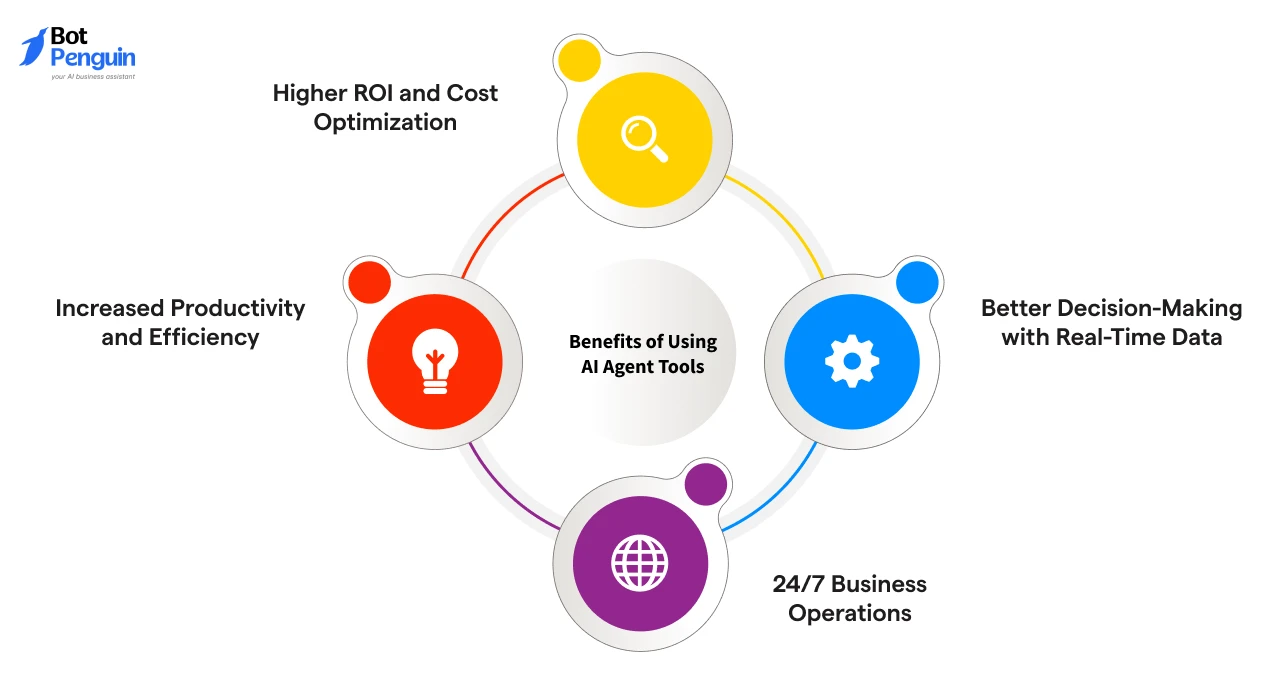
Driving Tangible Business Outcomes
Once the right automation solution is selected, organizations can measure the direct benefits of AI agent tools across productivity, efficiency, and decision-making.
These tools act as intelligent assistants that operate continuously, executing repetitive and strategic tasks without constant supervision. Their measurable impact is reflected in improved task completion rates, reduced operational costs, and faster response times across teams.
Modern AI agent tools are not just about automation—they provide context awareness, adapt to workflow changes, and learn from ongoing interactions. This adaptability contributes significantly to sustainable AI business growth, allowing companies to maintain speed and quality at scale.
1. Increased Productivity and Efficiency
AI agents automate high-volume, repetitive tasks, freeing teams to focus on strategy and innovation. Customer service agents can handle hundreds of queries simultaneously, while sales and marketing bots can qualify leads around the clock.
Businesses report productivity improvements of up to 40 percent when adopting AI-driven workflow automation, as time spent on manual coordination drops significantly.
Automation also ensures consistency. Every task follows predefined standards, reducing errors and maintaining quality across operations. This improves both employee performance and client satisfaction.
2. 24/7 Business Operations
Unlike human teams, AI agents never pause or require downtime. They ensure that workflows continue even after working hours. For example, an e-commerce business can manage orders, process support tickets, and respond to customer inquiries at any time of day.
This around-the-clock automation improves service delivery, enhances user experience, and helps businesses expand across time zones without adding staff. The result is a measurable gain in operational efficiency and global customer reach.
3. Better Decision-Making with Real-Time Data
AI agents collect and analyze data continuously, offering insights that guide business strategies. From sales patterns to customer behavior, every interaction becomes a source of actionable information.
Managers can use these insights to make decisions faster and with higher accuracy.
In finance or operations, predictive AI agents can flag anomalies or suggest improvements before issues escalate. This data-driven decision support improves forecasting accuracy and strengthens long-term planning, helping organizations make informed choices backed by continuous intelligence.
4. Higher ROI and Cost Optimization
Automating workflows through AI agents reduces the need for manual intervention, lowering labor costs and improving return on investment.
The automation ROI is amplified by reduced downtime, fewer errors, and faster execution speeds. Businesses can scale operations without proportionally increasing costs, achieving sustainable growth within existing budgets.
For example, a startup using AI for lead nurturing can reach thousands of potential customers without additional hiring. Enterprises can use AI-driven analytics to reduce process inefficiencies, optimizing cost structures across departments.
Practical Takeaway
The adoption of AI agents produces measurable results—greater productivity, non-stop automation, and smarter decisions powered by real-time insights. These outcomes directly contribute to AI business growth by improving efficiency, scalability, and profitability.
With these benefits established, the next section explores Final Thoughts, summarizing key insights from the analysis and how businesses can begin implementing AI automation with clarity and confidence.
Final Thoughts
AI agents have become essential to modern business automation, offering a practical path toward efficiency, scalability, and cost reduction. Whether managing operations, customer interactions, or internal processes, AI agent tools now form the foundation of high-performance digital systems.
Organizations that adopt AI early benefit from faster workflows, higher data accuracy, and more strategic use of resources. Businesses can begin by testing reliable platforms such as BotPenguin AI agents, which simplify automation with no-code deployment and 80-plus integrations. It allows teams to start small, automate routine processes, and expand as needs grow.
Adopting AI-driven solutions today ensures readiness for tomorrow’s operations, where intelligent automation defines competitive advantage and long-term growth.
Frequently Asked Questions (FAQs)
How fast is the adoption of AI agent tools in global businesses?
Over 60 percent of global businesses report integrating AI agent tools into daily workflows to improve operational efficiency and customer experience.
What impact do AI agent tools have on employee workload?
Studies show AI agent tools reduce repetitive task loads by 45 percent, allowing employees to focus on strategy, innovation, and client engagement.
How do AI agent tools support data accuracy in business automation?
By eliminating manual errors, AI agent tools increase data accuracy rates by up to 90 percent across reporting, forecasting, and analytics functions.
What industries benefit most from AI business automation?
Finance, retail, healthcare, and logistics are leading adopters of AI business automation, leveraging agents for analytics, customer service, and predictive decision-making.
How do AI agent tools influence customer satisfaction scores?
Businesses using AI agent tools for customer support report a 35 percent improvement in response speed and satisfaction, enhancing overall service quality.
How do BotPenguin AI agents improve business automation efficiency?
BotPenguin AI agents automate customer interactions, lead management, and ticketing across multiple platforms, helping businesses achieve faster response times and higher operational productivity.
